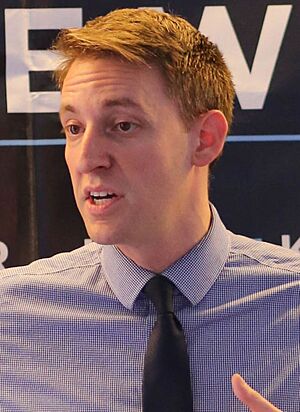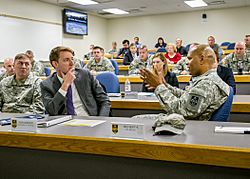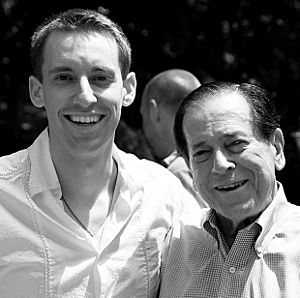Jason Kander facts for kids
Quick facts for kids
Jason Kander
|
|
|---|---|

Kander in 2016
|
|
| 39th Secretary of State of Missouri | |
| In office January 14, 2013 – January 9, 2017 |
|
| Governor | Jay Nixon |
| Preceded by | Robin Carnahan |
| Succeeded by | Jay Ashcroft |
| Member of the Missouri House of Representatives from the 44th district |
|
| In office January 12, 2009 – January 14, 2013 |
|
| Preceded by | Jenee Lowe |
| Succeeded by | Caleb Rowden |
| Personal details | |
| Born |
Jason David Kander
May 4, 1981 Overland Park, Kansas, U.S. |
| Political party | Democratic |
| Spouse |
Diana Kagan
(m. 2003) |
| Children | 2 |
| Relatives | John Kander (grand-uncle) |
| Education | American University (BA) Georgetown University (JD) |
| Military service | |
| Allegiance | |
| Branch/service | |
| Years of service | 2003–2011 |
| Rank | Captain |
| Unit | Missouri National Guard |
| Battles/wars | War in Afghanistan |
Jason David Kander (born May 4, 1981) is an American lawyer, author, former soldier, and politician. As a member of the Democratic Party, he was the secretary of state of Missouri from 2013 to 2017. Before that, he was a member of the Missouri House of Representatives.
Before his political career, Kander served as an intelligence officer in the Army Reserve. He was sent to Afghanistan and reached the rank of captain.
In 2016, he ran for the United States Senate but lost the election. Afterward, he started an organization called Let America Vote. This group works to protect voting rights. In 2018, he decided not to run for mayor of Kansas City. He shared that he was dealing with post-traumatic stress disorder (PTSD) and depression from his time in the army.
Since 2019, Kander has worked with the Veterans Community Project. This group helps homeless veterans by providing them with small homes and support. He also led a private mission to rescue hundreds of Afghan allies after U.S. troops left Afghanistan.
Contents
Early Life and School
Jason Kander was born on May 4, 1981, in Overland Park, Kansas. His mother was a juvenile probation officer, and his father was a police officer. His family is Jewish. He grew up in Shawnee, Kansas, with his younger brother and several foster children his parents cared for.
In high school, he played baseball and was a champion debater. After graduating in 1999, he went to American University in Washington, D.C. There, he studied political science, which is the study of government and politics.
Military Service
After the September 11 attacks, Kander joined the Army National Guard. While studying law at Georgetown University Law Center, he also trained to become an army officer.
After finishing law school in 2005, he chose to go to Afghanistan. He worked as an intelligence officer, investigating groups that were suspected of being corrupt or helping enemies of the United States.
When he came back home, Kander taught leadership skills to new army officers in Missouri. He was honorably discharged from the army in 2011 with the rank of captain.
Political Career
Missouri House of Representatives
In 2008, Kander was elected to the Missouri House of Representatives. This is one part of the state's government that makes laws. He worked on the state's budget and helped pass laws to protect people from crime.
In 2010, he worked with a Republican lawmaker to pass a bill for ethics reform. This means they made new rules to make sure politicians act honestly. He was re-elected to his seat later that year.
Missouri Secretary of State

In 2012, Kander ran for Missouri secretary of state. This official is in charge of the state's elections and business records. His opponent wanted to create stricter rules for voters to show identification. Kander disagreed and wanted to focus on making campaign finance laws better. Campaign finance laws are rules about how politicians can raise and spend money for their campaigns.
Kander won the election on November 6, 2012. At 32 years old, he was the youngest statewide elected official in the country at the time. As secretary of state, he continued to push for stronger ethics laws.
2016 U.S. Senate Election
In 2015, Kander announced he would run for the United States Senate. He wanted to represent Missouri in Washington, D.C. He ran against the current senator, Roy Blunt.
During the campaign, Kander presented himself as a political outsider. He highlighted his experience as an Army Intelligence officer. A campaign ad showing him putting together a rifle while blindfolded became very popular online.
Polls showed the race was very close. In the end, Kander lost the election, getting 46.4% of the vote compared to Blunt's 49.2%. Even though he lost, he got more votes than any other Democrat running for a statewide office in Missouri that year.
After the Senate Race
In 2018, Kander announced he would run for mayor of Kansas City. Many people thought he might even run for president in 2020. However, he later dropped out of the mayor's race.
He explained that he needed to get help for PTSD and depression related to his military service. He also took a break from his work with his organization, Let America Vote.
Helping Others
Let America Vote
In 2017, Kander started a group called Let America Vote. The group's goal is to fight against voter suppression, which are rules or actions that make it harder for people to vote. It also works to end gerrymandering, which is when voting districts are drawn in strange shapes to help one political party win.
Books and Podcasts
Kander has written two books. His first, Outside the Wire, talks about his time in the military and in politics. His second book, Invisible Storm, is a memoir about his experiences with PTSD. Both books were New York Times Bestsellers. He also hosts a podcast called Majority 54, where he discusses political issues.
Political Views
Kander has shared his views on many important topics.
- Campaigns: He believes there should be stricter rules on how money is used in politics.
- Education: He supports making college more affordable by lowering interest rates on student loans.
- Economy: He supports tax cuts for middle-class families and raising the federal minimum wage.
- Healthcare: He supports the Patient Protection and Affordable Care Act and believes it can be improved. He thinks states should expand Medicaid to help more people get health insurance.
- LGBT Rights: He supports marriage equality and laws that protect LGBT people from discrimination.
Awards and Personal Life
Kander has received several awards for his work in government and for his service. In 2023, Georgetown University gave him an honorary doctorate degree.
Kander married his high school sweetheart, Diana, in 2003. She is an author and entrepreneur who moved to the U.S. from the Soviet Union as a child. They have a son named True and a daughter named Bella.
His grand-uncle is John Kander, a famous composer who wrote the music for musicals like Cabaret and Chicago. Jason is a big fan of the Kansas City Royals baseball team.
See also
 In Spanish: Jason Kander para niños
In Spanish: Jason Kander para niños
 | James Van Der Zee |
 | Alma Thomas |
 | Ellis Wilson |
 | Margaret Taylor-Burroughs |



